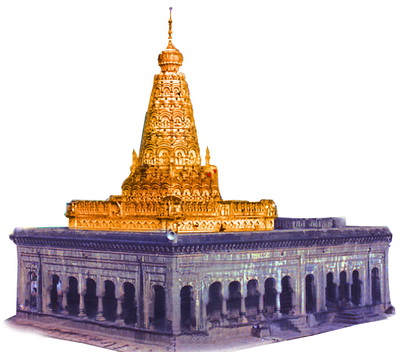

All Rights Reserved ©
Sharnbasveshwar Residential Public School, Gulbarga
Best Viewed in IE 6+, Firefox 2.1, Chrome, Opera
Power by K. K. Labs

About Society
Poojya Doddappa Appa
7th Mahadasoha Peethadhipati
Sharnbasveshwar Samsthan
Kalaburagi
In the lineage of this great philosophy, the seventh descendant of Mahadasoha Peetha, Poojya Doddappa Appa came as a saviour for the people of this backward region, which was suffering the undue double yoke of the Nizam of Hyderabad and the Britishers. It was Doddappa Appa's firm belief that no creature should be a victim of slavery because he perceived that spirit resides in all creatures. This spiritual attitude and outlook of Poojya Doddappa Appa paved the way for the freedom movement. Back in 1918 when the First World War was still going on and when Osmania University was established in the Nizam's State, Poojya Doddappa Appa established Sharanabasaveshwar Public Library in Gulbarga region to create awareness and awaken the people of this region. He aimed to arouse the spirit of nationalism, patriotic feelings and intense desire for freedom among the people.
Poojya Doddappa Appa strongly felt that creating awareness among the women folk is as essential as that of the men folk. That was the time when even men were denied educational opportunities and the women were kept behind the Pardha (Veil), when Poojya Doddappa Appa opened the First Girls School that too in Kannada Medium in the year 1934. This school opened a new chapter in the women's education in the Hyderabad Karnataka region and thus he did his best to serve the cause of women's education.
Poojya Doddappa Appa believed that spiritual attainment is the basis of independence. Therefore, he never failed to perform the 'Trikala Istalinga Pooja' and the 'Guru Jangama Dasoha', even during the most difficult times. When the Razakars attacked, many people in order to save their lives fled from Gulbarga to Sholapur and other safer places. During one of the hard times, Poojya Doddappa Appa was living with his family at Sholapur but he wanted the traditional Pooja to be continued at the Mahadasoha Peetha. So, he sent his fourteen-year eldest son Sharanabasawappa Appa along with Reverent Sri. Siddalinga Swamy to Gulbarga. Unmindful of the dangers lying ahead, Sharanabasawappa Appa dedicated himself totally to the worship of Shiva. Thus, he maintained the continuity of the pious tradition of performing the pooja. Then itself, Poojya Doddappa Appa, identified the future Peethadhipathi in his eldest son.
Poojya Doddappa Appa's uniqueness lies in strong sense of swadeshi consciousness. Gandhiji discarded foreign clothes and used only swadeshi clothes and thus awakened in the whole of the nation, the spirit of patriotism and national independence. Similarly Poojya Doddappa Appa discarded the weekly holiday on Sunday, which was given to the government servants by the British and also Friday, which was given by the Nizam. He declared Monday as a weekly holiday for all the educational institutions because Monday was regarded as the auspicious day and the real Indian folks' holiday, for the farmers constitute 80% of the population. Even this irked the Nizam. But, through such resolve, Poojya Doddappa Appa inculcated patriotism and the importance of independence in the people.
In the lineage of this great philosophy, the seventh descendant of Mahadasoha Peetha, Poojya Doddappa Appa came as a saviour for the people of this backward region, which was suffering the undue double yoke of the Nizam of Hyderabad and the Britishers. It was Doddappa Appa's firm belief that no creature should be a victim of slavery because he perceived that spirit resides in all creatures. This spiritual attitude and outlook of Poojya Doddappa Appa paved the way for the freedom movement. Back in 1918 when the First World War was still going on and when Osmania University was established in the Nizam's State, Poojya Doddappa Appa established Sharanabasaveshwar Public Library in Gulbarga region to create awareness and awaken the people of this region.
Founder of the Society
The Sharnbasveshwar Vidya Vardhak Sangha was founded in 1901 by the 6th peethadhipati, made a humble, yet a noble beginning with its first school housed in Mahadasoha - Mahamane the spiritual abode. Then onwards it has never looked back and has grown into leaps and bounds. Dedicating itself to the pursiute of service and excellence has grown into a mammoth educational centre imparting science, commerce, manegent , arts, engeneering & techanical education to nearly 20,000 students from LKG to PG in 40 institutions spending nearly 100 crores in 100 years of its meaningful and eventful existence.
Illustrious Sons of India and dignitaries including the father of nation, Mahatna Gandhi down to Dr. APJ Abdul Kalam, the former president of India have visited our Sangha.
Sharnbasveshwar Vidya Vardhak Sangha was founded in 1903 by Late Poojya Doddappa Appa, the 7th Peethadhipati of Sharnbasveshwar Maha Dasoha Samsthan, Gulbarga. It made a humble, yet a noble beginning with its first school housed in Mahadasoha Mahamane - the spiritual abode where Lord Sharnbasveshwar lived. Since then, it has never looked back and has grown into leaps and bounds, dedicating itself to the pursuit of service and excellence. In the course of time, it has grown into a mammoth educational centre imparting Science, Commerce, Arts, Management, Vocational, Engineering and Technical education to nearly Twenty Thousand Students from LKG to PG in forty institutions spending nearly hundred crore in the span of hundred years of its meaningful and eventful existence.
Many dignitaries have visited our institution - including the father of our nation Mahatma Gandhi down to Dr. A. P. J. Abdul kalam, the Former President of India. They have paid rich tributes to our Sangha as it has been rendering yeomen service by providing quality education to the people of backward region.
There have been many innovations in teaching methodology in the recent past, especially in higher education. But the essence of philosophy of our institution has remained as it was enunciated by Lord Sharnbasveshwar. Students may acquire great knowledge which may or may not be used by them in their life but the kind of education imparted in our institution lasts for ever, which is more rooted in encouraging our students to be self reliant, inquisite and positive thinking governed by great tolerance. The education that we impart gives the students enormous scope for independent thinking and absorbing the differences they confront in the society. The knowledge acquired without subjecting it to enquiry has no relevance. Hence we infuse the spirit of enquiry into the minds of young students.
Self-discipline and independent thinking are the two corner stones of our institution on which the life of students is built. The faculty members make all-out efforts to stimulate intellectual honesty among students. India is a land of composite culture, naturally the strength of our campus is multi-cultures as there are students coming from different walk of life and they are unified and united in our premises. This promotes better understanding among the students who come from different backgrounds. We make the students learn how to cope-up with varied styles and thinking, thereby motivate them to work together for the betterment of society. We make tireless efforts to make our students responsible citizens of the world.


